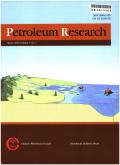注入酒精缓解混合层储层水堵塞的实验研究
IF 4
Q1 Earth and Planetary Sciences
引用次数: 0
摘要
本研究探讨了注入酒精作为一种刺激处理方法对缓解井筒附近水堵塞的有效性。多年来,水堵塞一直是油气行业面临的一个经常性挑战,导致油井生产率下降。在多层混合储层中,当生产井因油井干预或修井而关闭时,由于各层之间的压力差,水可能会从水区通过井筒侵入含油层。水侵会对油井的生产产生重大影响。它会降低产油率,增加断水量,缩短油井的寿命。因此,必须采取措施减轻混合油藏的水侵效应。本研究探讨了在混合油藏中使用注入酒精来缩短过渡时间和修复地层损害。有限的研究表明,酒精有可能提高天然气凝析油藏的流体相对渗透率,减少井筒附近的凝析油库。然而,这种方法尚未在混合油藏中进行测试。使用贝里亚砂岩岩心和德克萨斯轻质原油样本进行了一系列岩心充水试验。岩心水浸装置的设计代表了地层中的水堵塞情况。测试了两种不同的酒精:异丙醇(IPA)和甲醇。实验结果表明,互溶剂可显著减少水堵塞并缩短过渡期。然而,随着注入醇分子量的增加,沥青质沉淀可能会成为一个问题。本文章由计算机程序翻译,如有差异,请以英文原文为准。
An experimental study of alcohol injection to mitigate water blockage in commingled layered reservoirs
This study explores the effectiveness of alcohol injection as a stimulation treatment to mitigate water blockage in the vicinity of the wellbore. Over the years, water blockage has emerged as a recurring challenge within the oil and gas industry, leading to diminished well productivity. In a commingled reservoir with multiple layers, when a producing well is shut-in for well intervention or workover, water may encroach from water zones into the oil-bearing formations through the wellbore due to pressure differences between the layers. Water encroachment can have a significant impact on the production of a well. It can reduce the oil production rate, increase the water cut, and shorten the well's lifespan. Therefore, it is essential to take steps to mitigate the water encroachment effect in commingled reservoirs. This study explores the use of alcohol injection to reduce transition time and remediate formation damage in commingled oil reservoirs. Limited studies have shown that alcohol has the potential to enhance fluid relative Permeability in gas condensate reservoirs and reduce condensate banking near the wellbore. However, this approach has not yet been tested in commingled oil reservoirs. A series of core flooding tests were conducted using Berea sandstone cores and a Texan light crude oil sample. The core flood setup was designed to represent the water blockage condition in the formation. Two different alcohols were tested: isopropyl alcohol (IPA) and Methanol. Experimental results showed that mutual solvents significantly reduce water blockage and shorten the transition period. However, asphaltene precipitation may become a problem with increasing the molecular weight of injected alcohol.
求助全文
通过发布文献求助,成功后即可免费获取论文全文。
去求助
来源期刊

Petroleum Research
Earth and Planetary Sciences-Geology
CiteScore
7.10
自引率
0.00%
发文量
90
审稿时长
35 weeks
 求助内容:
求助内容: 应助结果提醒方式:
应助结果提醒方式:


